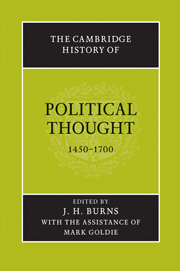Book contents
- Frontmatter
- Introduction
- I Renaissance and Counter-Renaissance
- II Religion, civil government, and the debate on constitutions
- III Absolutism and Revolution in the Seventeenth Century
- IV The end of Aristotelianism
- V Natural law and utility
- 19 Pufendorf
- 20 The reception of Hobbes
- 21 Locke
- Conclusion
- Biographies
- Bibliography
- Index of names of persons
- Index of subjects
- References
20 - The reception of Hobbes
from V - Natural law and utility
Published online by Cambridge University Press: 28 March 2008
- Frontmatter
- Introduction
- I Renaissance and Counter-Renaissance
- II Religion, civil government, and the debate on constitutions
- III Absolutism and Revolution in the Seventeenth Century
- IV The end of Aristotelianism
- V Natural law and utility
- 19 Pufendorf
- 20 The reception of Hobbes
- 21 Locke
- Conclusion
- Biographies
- Bibliography
- Index of names of persons
- Index of subjects
- References
Summary
The polemic against Hobbes: the theological premises
The German philosopher Leibniz, the most persistent and percipient of Hobbes' continental critics, believed that the crux of the quarrel between them lay in Plato's Euthyphro Dilemma. Socrates wanted to know of Euthyphro whether a thing was ‘just’ (or ‘good’ or ‘true’) by virtue of God having willed it, or whether God willed it because it was of itself just. If the former, then justice is arbitrary, having no essential nature; it subsists contingently, by divine fiat, and can be humanly known only as empirical knowledge of the facts of God's utterances. This is called the voluntarist, or nominalist, doctrine. But if the latter answer is correct (and Socrates thought it was), then justice does have an essence distinct from its being willed, and it can be intuited by rational agents. This answer is known as the essentialist, or realist, doctrine. In the biblical terms of seventeenth-century debate this dilemma was expressed as the choice between the awesome, peremptory God of Abraham and Isaac, or of Job, and the philosophical, rational God of the Johannine Logos. Because God told Abraham to kill Isaac it seemed that killing one's son was not an immutable evil, but only evil until God said otherwise: justice is contingent upon God's command. Yet if, on the other hand, God is the supreme light of reason, then He will act only in accordance with self-consistent rules embodied in the natural order.
- Type
- Chapter
- Information
- The Cambridge History of Political Thought 1450–1700 , pp. 589 - 615Publisher: Cambridge University PressPrint publication year: 1991
References
- 10
- Cited by

